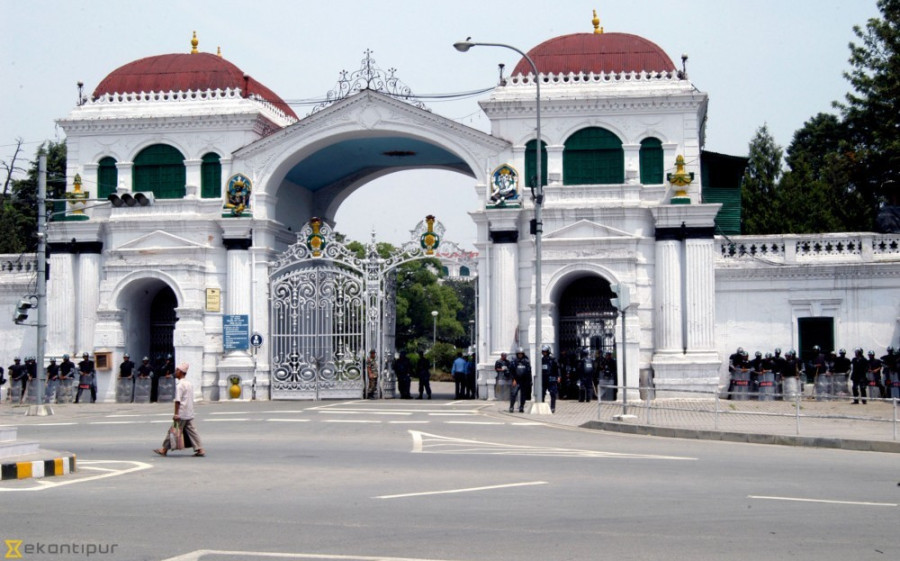Politics
Constitutional Council meeting postponed yet again without making appointments
Delay in appointments to crucial commissions weakens institutions, experts say.
Binod Ghimire
Political wrangling over power-sharing has continued to delay appointments to crucial constitutional commissions that are tasked with everything from overseeing inclusion to working to safeguard minority rights.
The Constitutional Council, a body headed by the prime minister and mandated to make appointments to the commissions, has not held a meeting since March 25. That meeting picked Dinesh Thapaliya for the post of chief election commissioner.
When Prime Minister KP Sharma Oli called a meeting of the council for Tuesday earlier this week, there were expectations that long-awaited appointments would finally be made. But the meeting was postponed for Wednesday, and on Wednesday, it was postponed again after Nepali Congress President Sher Bahadur Deuba, a council member, failed to show up. This was the third consecutive time the meeting has been cancelled since October 22.
The six-member council has the chief justice, speaker and deputy speaker of the House of Representatives, chairman of the National Assembly, and leader of the main opposition as members. The Minister for Law and Justice also takes a seat when the appointment is related to the judiciary while the chief secretary functions as the secretary of the council.
According to officials, Deuba has been unhappy with appointments ever since January, when the council picked chairpersons for five commissions without his agreement. The Nepali Congress, the opposition party that Deuba leads, even boycotted the parliamentary hearing of the chairpersons to protest against the ‘unilateral’ appointment.
An aide to a member of the council told the Post on condition of anonymity that the primary opposition party is looking for “a respectable share” in the constitutional bodies.
While four commissions—Madhesi, Dalit, Tharu and Muslim—have chairpersons but no members, two others—Women and Indigenous Nationalities—don’t even have chairpersons. The Inclusion Commission had a chairperson until July 28, when Shanta Raj Subedi resigned from the post.
The constitution has provisioned the formation of seven commissions to advocate the rights of marginalised and deprived communities with a 10-year mandate, beginning from the day of the promulgation of the charter.
Positions in two other constitutional commissions—the Commission for the Investigation of Abuse of Authority and the Election Commission—are also vacant.
Though Congress leaders say that the reason behind having the leader of the primary opposition on the council is to ensure that the decisions taken are consensual, experts say that the council cannot be held hostage to political bargaining in the name of “consensus”.
“The delay is not because there is a dearth of competent people; it is because the parties, or political leaders for that matter, are trying to install their confidantes in the commissions,” Ram Dayal Rakesh, a former member of the National Human Rights Commission, told the Post.
In principle, the constitutional commissions, especially those envisioned as inclusion commissions, should have started functioning as soon as the constitution was promulgated to ensure that they could work in line with other constitutional provisions that guarantee the rights of various communities.
“The continuing delay in appointments shows that the commissions are not the parties’ priority,” said Rakesh.
On Wednesday, hours before the scheduled meeting of the council, Oli, Deuba and Nepal Communist Party Co-chair Pushpa Kamal Dahal had held a meeting, which officials familiar with the development believe was aimed at reaching consensus on the appointments.
“The meeting did not take place because we were told that Deuba had a meeting with the visiting Bangladeshi president,” Shiva Maya Tumbahangphe, deputy speaker of the House, told the Post.
The Nepali Congress is concerned that Oli might appoint office bearers to the constitutional commissions without its consent and wants assurances from the ruling party that the appointments will be made on the basis of consensus.
“We won’t accept it if the government appoints officials yet again without the opposition’s agreement,” Pushpa Bhusal, the Congress whip, told the Post.
But many say that Deuba’s reluctance to participate in the council meeting does not stem completely from his concern over appointments, as his focus is more on having a better say when it comes to appointments to the transtional justice commissions.
“Whatever the reason, political squabbling should not delay appointments to constitutional commissions, as it affects their institutionalisation,” said Rakesh. “The government’s apathy towards the commissions is actually hampering the empowerment of marginalised and deprived communities. These commissions are the outcome of continuous pressure from various groups, but they have been left paralysed when they should be functioning fully.”
Bijay Kumar Datta, chairperson of the Madhesi Commission, said that the delay in the appointment of office bearers is increasingly affecting the work.
“There is a reason for envisioning the commission with five members. Without officials, we cannot perform our job,” said Datta. “The commission has just eight staff against the 30 designated posts. And to add insult to injury, the Ministry of Finance hasn’t released the needed budget yet.”




 11.12°C Kathmandu
11.12°C Kathmandu















